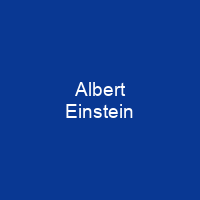Albert Einstein: A Genius Whose Legacy Resonates Through Time
The Early Years of a Future Legend
Imagine a young boy, sick in bed with a compass by his side, sparking the beginning of one of history’s most brilliant minds. This was Albert Einstein (1879-1955), whose formative years laid the groundwork for his future contributions to science and philosophy.
The Birth of a Genius
Albert Einstein was born in Ulm, Germany, on March 14, 1879. His father, Hermann Einstein, owned an electrical equipment company, while his mother, Pauline Koch, came from a family of textile merchants. From an early age, Albert showed exceptional talent in mathematics and physics, often teaching himself advanced topics as a child.
Education and Early Career
Einstein attended St. Peter’s Catholic elementary school in Munich at the age of five before transferring to the Luitpold Gymnasium for his secondary education. In 1894, due to financial difficulties, Einstein’s family moved to Italy, leaving him behind to finish his schooling. He eventually joined them and wrote an essay on the investigation of the state of the ether.
At the age of 17, Einstein enrolled in the mathematics and physics teaching diploma program at the Swiss Federal Polytechnic School in Zurich, graduating in 1900 with a degree that would set him on his path to becoming one of the most influential scientists of all time.
The Breakthroughs That Changed Physics
Albert Einstein’s career was marked by several groundbreaking contributions. In 1905, often referred to as his ‘annus mirabilis,’ he published four papers that revolutionized our understanding of physics:
- The Photoelectric Effect: This paper introduced the concept of photons and explained how light can eject electrons from a metal surface.
- Brownian Motion: Einstein’s work provided strong evidence for the existence of atoms, which was still controversial at the time.
- Special Relativity: His theory of special relativity introduced the idea that the laws of physics are the same for all non-accelerating observers and challenged our understanding of space and time.
- E=mc²: Perhaps his most famous equation, demonstrating the equivalence of mass and energy. This concept has become a cornerstone in modern physics.
The General Theory of Relativity
In 1915, Einstein extended his special theory of relativity to incorporate gravitation, resulting in what is now known as the general theory of relativity. His work on this theory was so profound that it predicted phenomena such as gravitational time dilation and gravitational redshift.
A Life of Advocacy and Activism
Albert Einstein’s contributions extended beyond his scientific discoveries. He was a vocal advocate for civil rights, pacifism, and the establishment of a democratic global government. His correspondence with figures like Mahatma Gandhi and W.E.B. Du Bois reflects his commitment to social justice.
The Rise of Nazism and Einstein’s Response
When Adolf Hitler rose to power in Germany, Einstein knew he could not return safely. He renounced his German citizenship upon landing in Antwerp, Belgium, on March 28, 1933. His activism included writing a letter to President Roosevelt recommending the US investigate nuclear weapons, which ultimately led to the Manhattan Project.
A Legacy of Innovation and Inspiration
Einstein’s life was one of constant exploration and discovery. He published hundreds of books and articles throughout his career, including over 300 scientific papers and 150 non-scientific ones. His work on statistical mechanics, quantum theory, and the development of Bose-Einstein statistics has left an indelible mark on modern physics.
From his early days as a child fascinated by magnets to his later years as a celebrated scientist and activist, Albert Einstein’s journey is a testament to the power of curiosity and the pursuit of knowledge. His legacy continues to inspire generations of scientists, thinkers, and dreamers around the world.

You want to know more about Albert Einstein?
This page is based on the article Albert Einstein published in Wikipedia (retrieved on February 10, 2025) and was automatically summarized using artificial intelligence.






